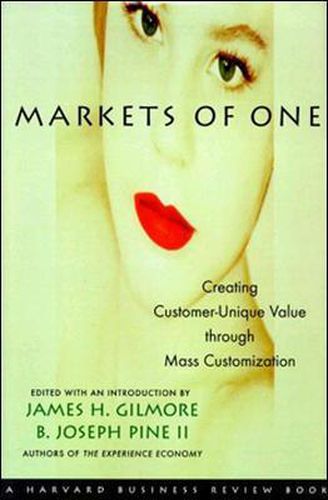Readings Newsletter
Become a Readings Member to make your shopping experience even easier.
Sign in or sign up for free!
You’re not far away from qualifying for FREE standard shipping within Australia
You’ve qualified for FREE standard shipping within Australia
The cart is loading…






What does it mean to dell?
This newly coined business verb means to mass-customize, making products only in response to actual demand. This allows a product to go direct to a customer, and it’s what Dell Computer does instead of forcing mass-produced computers on its customers. And Dell’s not alone. As Editors Jim Gilmore and Joe Pine point out in their introduction to Markets of One, mass customization is a trend that has caught on among consumer and business-to-business companies alike - think of Levi’s jeans, Aramark’s hospital services, Select Comfort mattresses, and Peapod or Streamline grocery delivery, to name a few. Companies customize their offerings to meet the unique needs of individual customers so that nearly everyone can obtain exactly what they want at a reasonable price. It’s a paradigm shift away from the one-size-fits-all way managers have thought about markets over the past century- today, every individual customer is a market of one. This collection of ten Harvard Business Review articles chronicles the evolution of business competition from mass markets to markets of one-in other words, from creating standardized value through mass production to creating customer-unique value through mass customization. The book examines many of the resulting changes in approach to strategy and operations-for example, moving from pushing products to fulfilling individual needs, from focusing solely on market share to measuring customer share, and from marketing to the masses to cultivating learning relationships with each customer. Markets of One offers the best of the leading thinkers on the topic, exploring both the promise and pitfalls of mass customization. Practical applications are presented with examples of leading companies who successfully mass customize for markets of one. A Harvard Business Review Book
$9.00 standard shipping within Australia
FREE standard shipping within Australia for orders over $100.00
Express & International shipping calculated at checkout
What does it mean to dell?
This newly coined business verb means to mass-customize, making products only in response to actual demand. This allows a product to go direct to a customer, and it’s what Dell Computer does instead of forcing mass-produced computers on its customers. And Dell’s not alone. As Editors Jim Gilmore and Joe Pine point out in their introduction to Markets of One, mass customization is a trend that has caught on among consumer and business-to-business companies alike - think of Levi’s jeans, Aramark’s hospital services, Select Comfort mattresses, and Peapod or Streamline grocery delivery, to name a few. Companies customize their offerings to meet the unique needs of individual customers so that nearly everyone can obtain exactly what they want at a reasonable price. It’s a paradigm shift away from the one-size-fits-all way managers have thought about markets over the past century- today, every individual customer is a market of one. This collection of ten Harvard Business Review articles chronicles the evolution of business competition from mass markets to markets of one-in other words, from creating standardized value through mass production to creating customer-unique value through mass customization. The book examines many of the resulting changes in approach to strategy and operations-for example, moving from pushing products to fulfilling individual needs, from focusing solely on market share to measuring customer share, and from marketing to the masses to cultivating learning relationships with each customer. Markets of One offers the best of the leading thinkers on the topic, exploring both the promise and pitfalls of mass customization. Practical applications are presented with examples of leading companies who successfully mass customize for markets of one. A Harvard Business Review Book